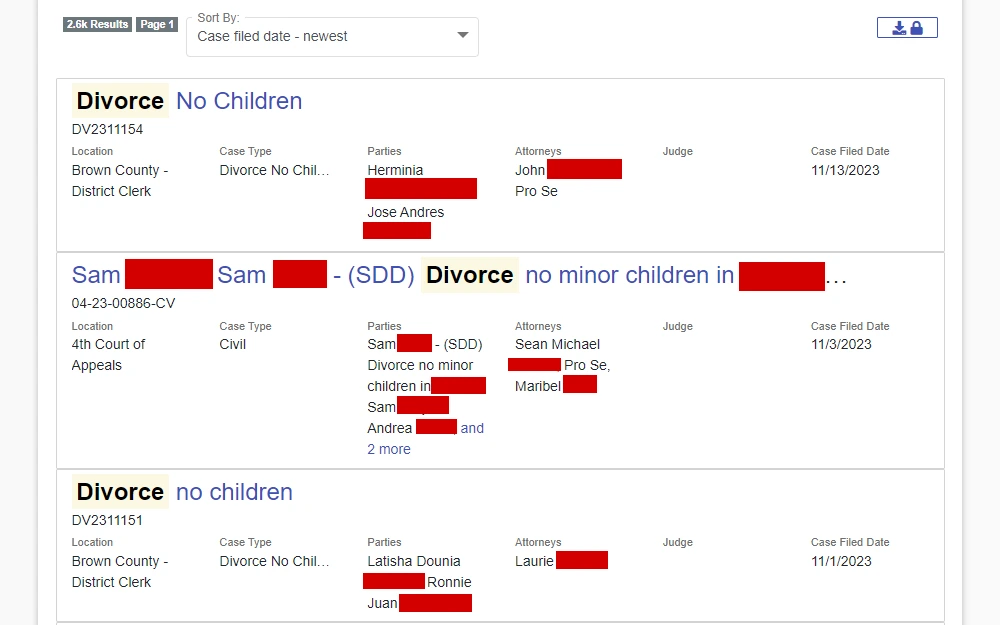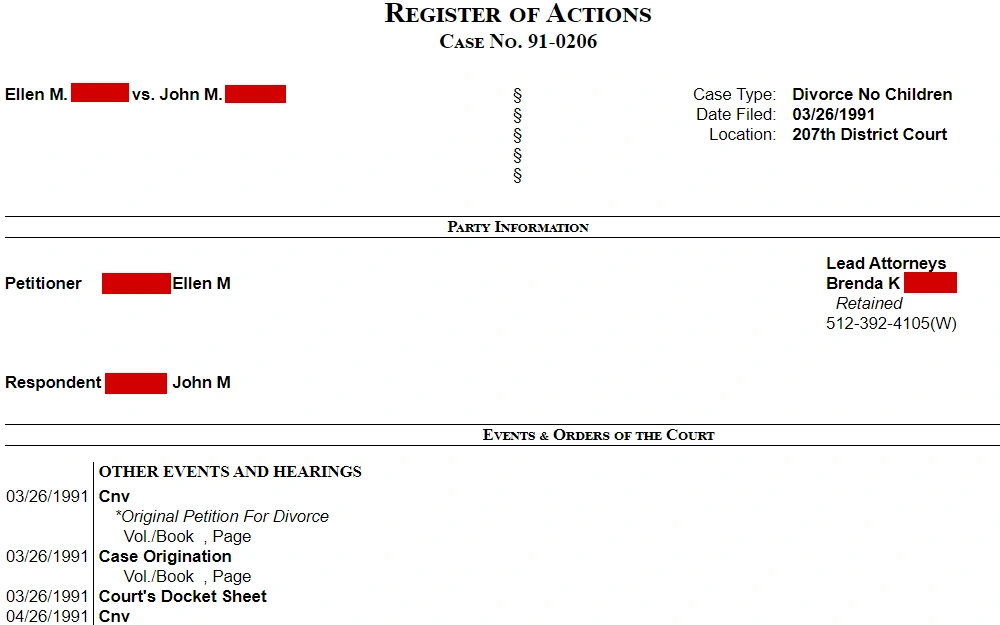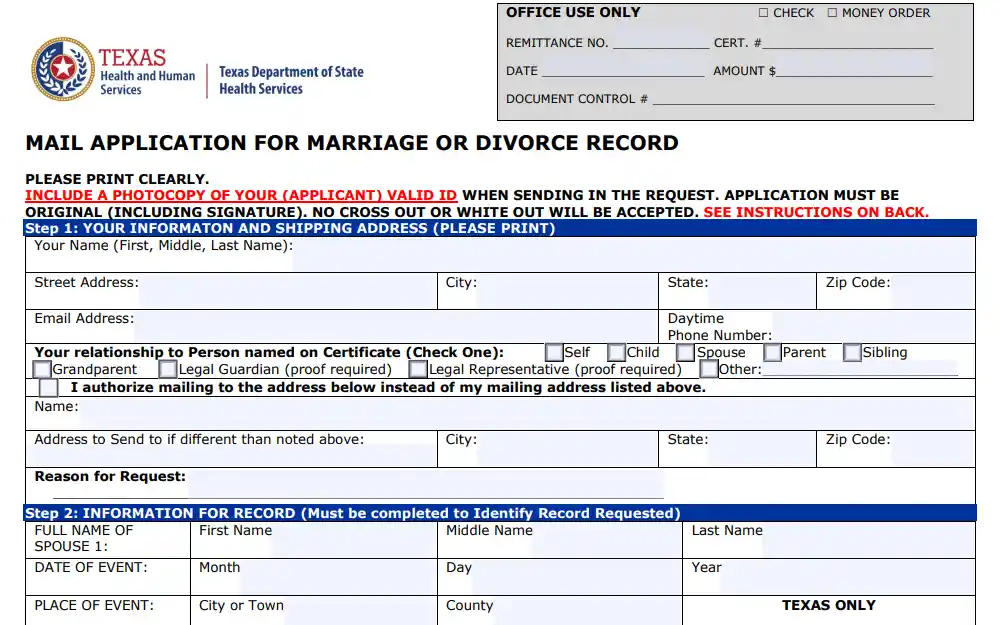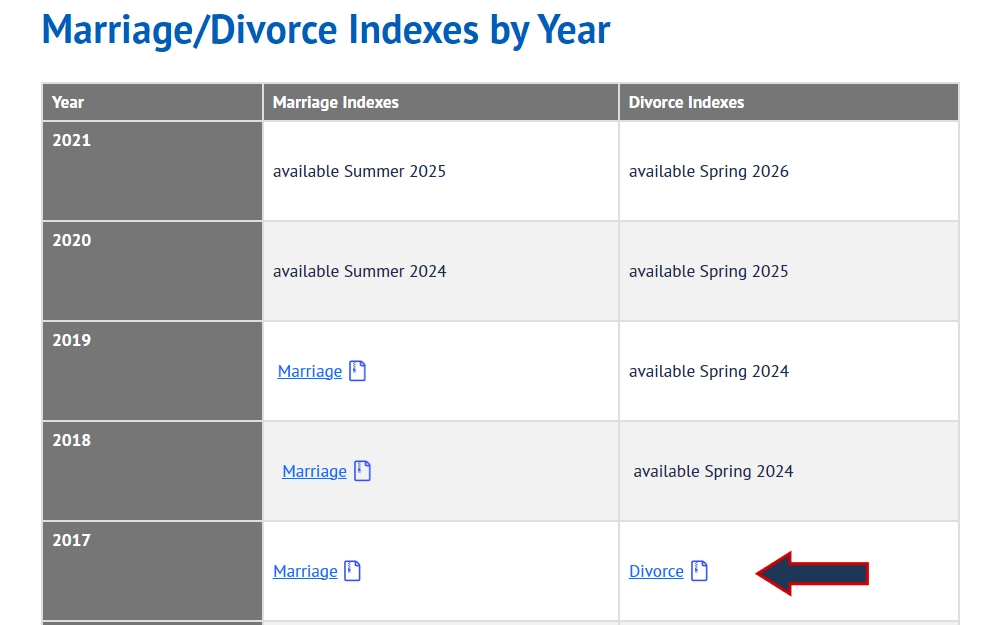Search Hays County divorce records for free using the links and guidance offered in this resource.
Like other types of government documents, divorce records are available under the Texas Public Information Act.
Divorce and dissolution of marriage documents can be found in different ways, so it’s vital to know the best ways to access them; this article teaches you everything you need to know about viewing and acquiring information on divorces that were finalized in Hays County, Texas.
This resource was written by Attorney Robert Bailey Jr, who holds a Juris Doctorate from Widener University School of Law.
How To Search Hays County Divorce Records for Free
Now that you know you can search for public divorce records, you must determine the best way to access them. For divorce records in Hays County, a citizen can access this information through a couple of different options with the District Clerk’s Office.1

The quickest way to begin your search is by finding divorce records using the Hays County Court Records Search Tool.3 The Hays County District Clerk provides a specific search tool that is limited to civil, family (including divorces) and probate cases.
To conduct a search, you can look for divorce records by either party’s name. There is also a “soundex” option you can check if you do not know the exact spelling of a person’s name.
It will provide results for both the regular and phonetic spelling you provide. To narrow down your search results, you can set a date range for when the divorce was filed as well as select the case status (closed, open, or all).
Once you perform a search, the results will provide you with a brief summary of the case record. The summary results will include the case number, party names, date and location where the case was filed, type of case, and status.
Since this search tool covers a variety of case types, you will have to look in the column that describes the type of case to confirm it is a divorce matter. Here, you can also see if the divorce involved children or not.
Once you locate the divorce record you are researching you can click on the case number. When you click on the case record, you can view the complete online divorce record.
Here, you can view the party information, including the names of any attorneys representing either person in the divorce case. There is also a section labeled “Events & Orders of the Court,” where you can view a chronological listing of every action that occurred in a particular divorce case from when the initial petition for divorce was filed to when the judge issued the decree.

While this is the complete online record, the District Clerk will likely have additional information for you to view and request. You can use the information obtained from your online inquiry to further your search, as detailed below.
A citizen can go in person to the District Clerk’s Office to request a record or use their search terminals. You can also mail a record request for a divorce record to the District Clerk’s Office, which is located at the address below:
Hays County District Clerk
Hays County Government Center
712S. Stagecoach Trail, Suite 2211
San Marcos, Texas 78666
If you need to make a request for a certified or noncertified divorce record, you can do so by providing the necessary identifying information (party names, case number, date filed) and paying the fee. The cost is $0.50 per page for a noncertified copy and $1.00 per page for one that is certified. If you are unsure of specific details, you can pay $5.00 per name searched for the district clerk to review records over the past ten years.
If you have any questions on how to search or submit a request for a divorce certificate, you can contact the Hays County District Clerk by email at [email protected] or by calling 512-393-7660. The District Clerk’s Office is open 8:00 AM to 4:00 PM, Monday through Friday.
In some instances, you can also obtain a person’s divorce record from a city or town’s government agency. In Hays County, there are no cities that provide this option, and all requests must be submitted through the District Clerk.
How To View Statewide Divorce Records via the Texas Department of State Health Services
The tools and resources provided earlier are limited to finding divorce records that were filed in Hays County. Each county has its own process and nuances for how to access and request these records. However, there are statewide options that can allow you to access a broad range of Texas divorce information.
Another option is to request a divorce verification letter from the Vital Statistics Section. While this is not the same as a certificate or decree, it will provide official verification that a party was divorced, along with some limited information about the divorce (e.g., when and where it occurred). These verification letters are restricted to a limited group of people. Only the below group of people can request a divorce verification letter:
- Person identified on the record
- Legal representative
- Spouse
- Parent
- Guardian
- Sibling
- Child
- Grandparent
- A person with an identifiable legal interest in the record (e.g., court order)
To make a request for a divorce verification letter, you must know the full name of both parties, the date they were divorced, and the county where the decree was issued. From there, you can also include the age when they were divorced and their social security number if you have it available.
You can either submit a request for divorce verification online or complete their Application for Divorce Record.5, 6 With the completed application and fee, you can either drop off the application in person at an approved local office or mail it to the designated address below:
Texas Vital Statistics
Department of State Health Services
P.O. Box 12040
Austin, Texas 78711

The fee for a divorce verification letter is $20.00 per copy. If you have any additional questions about the process for requesting a divorce verification, view the FAQ Page for Marriage & Divorce or call the Vital Statistics Section at 888-963-7111.7 They are open and available for calls Monday through Friday, from 8:00 AM to 4:00 PM.
One option is to view the divorce indexes provided by the Vital Statistics Section of the Texas Department of State Health Services.8 Starting in 1968, you can view an index for each year, which covers dissolved marriages throughout Texas.

These indexes are available to anyone and contain every divorce that has been issued by a district court in Texas. This includes “common law divorces,” which are dissolutions of a common-law marriage. Common law marriage is recognized in Texas and is the term for a process in which the government recognizes a relationship of two people as married, even though they did not follow the proper steps for doing so.
These indexes contain a lot of valuable information to learn more about a couple and to help further your research. The indexes will provide you with the names and ages of each party to the divorce, along with statistical data on kids under 18 at the time this event transpired.
You can view the date of divorce, the county that issued the decree, and when they were married. If you want to perform a county search for the complete divorce record, you can use the file number provided in these indexes.
For questions specific to the marriage indexes, you can email them to [email protected].
Who Can Look Up Divorce Records in Hays County Texas?
Divorce records are considered public records, which means at least some basic information on a terminated marriage in Texas is available to everyone. Access to these divorce records must be provided, pursuant to the rights set forth in Texas’ Public Information Act.9 This state statute provides a general mandate to provide a variety of records, including divorce documents, to the general public for inspection and copying.
While the right to divorce records is broadly granted, there are a couple of situations in which you may not be able to find the information you are seeking.
Sensitive Information: Certain information can be designated as sensitive and restricted from the general record. This can be done by redacting it from certain documents or simply not including it in the public record. While there are no set categories for sensitive information, examples include bank account information, social security numbers, and details on minor children.
Sealed Records: In certain limited circumstances, a party can petition the court to have the record sealed if they can successfully demonstrate that the harm of releasing the information is greater than the harm of restricting it. A person must also be able to prove that there is no other alternative solution, such as redacting the divorce record.
Beyond those exceptions, divorce records are generally available. Availability includes noncertified (informational) copies as well as certified records, which can be used as official documentation to prove that a divorce occurred. This may be needed in various legal or business situations.
While the public has general access to these records, there are different types of records that can be requested, and some are easier to get than others. For instance, a divorce decree or certificate is usually requested through a formal process.
A decree is a document where a judge officially declares the divorce official and the requirements that come along with it (e.g., spousal support, marital property division, etc.). A certificate is official proof of a divorce with basic information.
Note: A state agency may have different requirements than a county government office. For instance, state agencies, as discussed earlier, restrict records to a limited group of people.
Generally, divorce papers include the documents submitted as part of a dissolution and the general record. This information can be accessed without submitting a formal request.
If you are having trouble accessing records with the tools provided in this article, you could consider using a third-party provider to find them for you. It may be that the record was not made available by the county through its usual means, or maybe the divorce occurred somewhere else. These records can be used for informational purposes only unless the third-party provider is endorsed by a government agency to provide these documents.
You should now have a better understanding of the various types of Hays County divorce records; use the tools and steps provided in this article to effectively access the divorce records you’re looking for.
References
1Hays County District Clerk’s Office. (n.d.). District Clerk. Retrieved December 26, 2023, from <https://hayscountytx.com/courts/district-clerk/>
2Hays County District Clerk’s Office. (n.d.). Advanced Search. SearchTX. Retrieved December 26, 2023, from <https://research.txcourts.gov/CourtRecordsSearch/#!/advancedSearch>
3Hays County Courts. (n.d.). Hays County Courts Records Inquiry. Retrieved December 26, 2023, from <https://public.co.hays.tx.us/default.aspx>
4Hays County Courts. (n.d.). Register Of Actions. Retrieved December 26, 2023, from <https://public.co.hays.tx.us/CaseDetail.aspx?CaseID=11497133>
5Texas Department of State Health and Human Services. (n.d.). Divorce Verification Letter | DSHS Official Application. Order Vital Records. Retrieved December 26, 2023, from <https://ovra.txapps.texas.gov/ovra/order-divorce-verification-letter>
6Texas Department of State Health and Human Services. (2022, February). Mail Application For Marriage Or Divorce Record. Retrieved December 26, 2023, from <https://www.dshs.texas.gov/sites/default/files/vs/doc/marr-div-verification-wedding.pdf>
7Texas Department of State Health and Human Services. (n.d.). Marriage and Divorce FAQs. Texas DSHS. Retrieved December 26, 2023, from <https://www.dshs.texas.gov/vital-statistics/frequently-asked-questions/marriage-divorce-faqs>
8Texas Department of State Health and Human Services. (n.d.). Marriage/Divorce Indexes. Texas DSHS. Retrieved December 26, 2023, from <https://www.dshs.texas.gov/vital-statistics/marriage-divorce-records/marriage-divorce-indexes>
9Texas Comptroller of Public Accounts. (n.d.). The Public Information Act. Texas Comptroller. Retrieved December 26, 2023, from <https://comptroller.texas.gov/about/policies/open-records/public-information-act.php>
